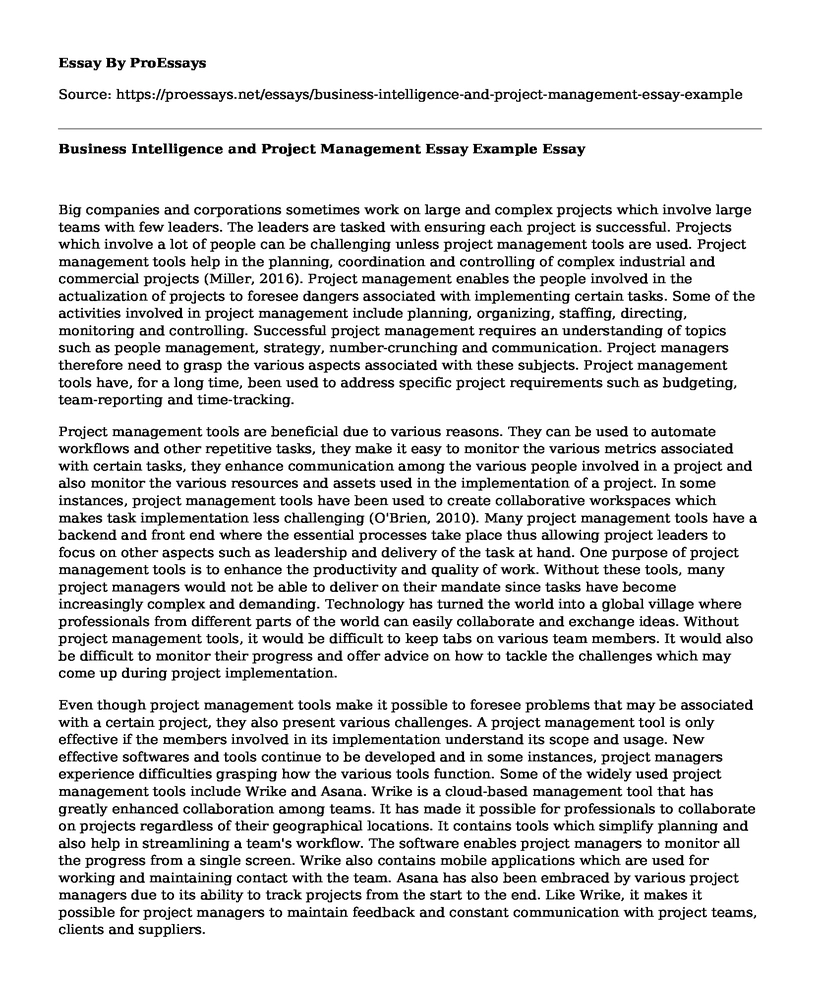Big companies and corporations sometimes work on large and complex projects which involve large teams with few leaders. The leaders are tasked with ensuring each project is successful. Projects which involve a lot of people can be challenging unless project management tools are used. Project management tools help in the planning, coordination and controlling of complex industrial and commercial projects (Miller, 2016). Project management enables the people involved in the actualization of projects to foresee dangers associated with implementing certain tasks. Some of the activities involved in project management include planning, organizing, staffing, directing, monitoring and controlling. Successful project management requires an understanding of topics such as people management, strategy, number-crunching and communication. Project managers therefore need to grasp the various aspects associated with these subjects. Project management tools have, for a long time, been used to address specific project requirements such as budgeting, team-reporting and time-tracking.
Project management tools are beneficial due to various reasons. They can be used to automate workflows and other repetitive tasks, they make it easy to monitor the various metrics associated with certain tasks, they enhance communication among the various people involved in a project and also monitor the various resources and assets used in the implementation of a project. In some instances, project management tools have been used to create collaborative workspaces which makes task implementation less challenging (O'Brien, 2010). Many project management tools have a backend and front end where the essential processes take place thus allowing project leaders to focus on other aspects such as leadership and delivery of the task at hand. One purpose of project management tools is to enhance the productivity and quality of work. Without these tools, many project managers would not be able to deliver on their mandate since tasks have become increasingly complex and demanding. Technology has turned the world into a global village where professionals from different parts of the world can easily collaborate and exchange ideas. Without project management tools, it would be difficult to keep tabs on various team members. It would also be difficult to monitor their progress and offer advice on how to tackle the challenges which may come up during project implementation.
Even though project management tools make it possible to foresee problems that may be associated with a certain project, they also present various challenges. A project management tool is only effective if the members involved in its implementation understand its scope and usage. New effective softwares and tools continue to be developed and in some instances, project managers experience difficulties grasping how the various tools function. Some of the widely used project management tools include Wrike and Asana. Wrike is a cloud-based management tool that has greatly enhanced collaboration among teams. It has made it possible for professionals to collaborate on projects regardless of their geographical locations. It contains tools which simplify planning and also help in streamlining a team's workflow. The software enables project managers to monitor all the progress from a single screen. Wrike also contains mobile applications which are used for working and maintaining contact with the team. Asana has also been embraced by various project managers due to its ability to track projects from the start to the end. Like Wrike, it makes it possible for project managers to maintain feedback and constant communication with project teams, clients and suppliers.
References
Miller, D. (2016, November 7). 5 Reasons Why You Need a Project Management Tool for Your Business. Retrieved from https://project-management.com/5-reasons-why-you-need-a-project-management-tool-for-your-business/
O'Brien, C. (2010, June 21). What Are the Benefits of Using Project Management Tools? Retrieved from https://bizfluent.com/list-6647483-benefits-using-project-management-tools-.html
Cite this page
Business Intelligence and Project Management Essay Example. (2022, Nov 20). Retrieved from https://proessays.net/essays/business-intelligence-and-project-management-essay-example
If you are the original author of this essay and no longer wish to have it published on the ProEssays website, please click below to request its removal:
- Time Management Tips for Learners
- Role of Leadership in Change Management
- Why Digital Marketing Is Important For Hotel and Restaurant Business? - Paper Example
- Quantum Leadership: Building Better Partnerships Essay
- Limit of Expression of Culture in Society by Public Institutions Essay
- Corporate Insider Threat Detection Paper Example
- Essay Example on Transactional Leadership: Supervision, Organization, Performance & Rewards







